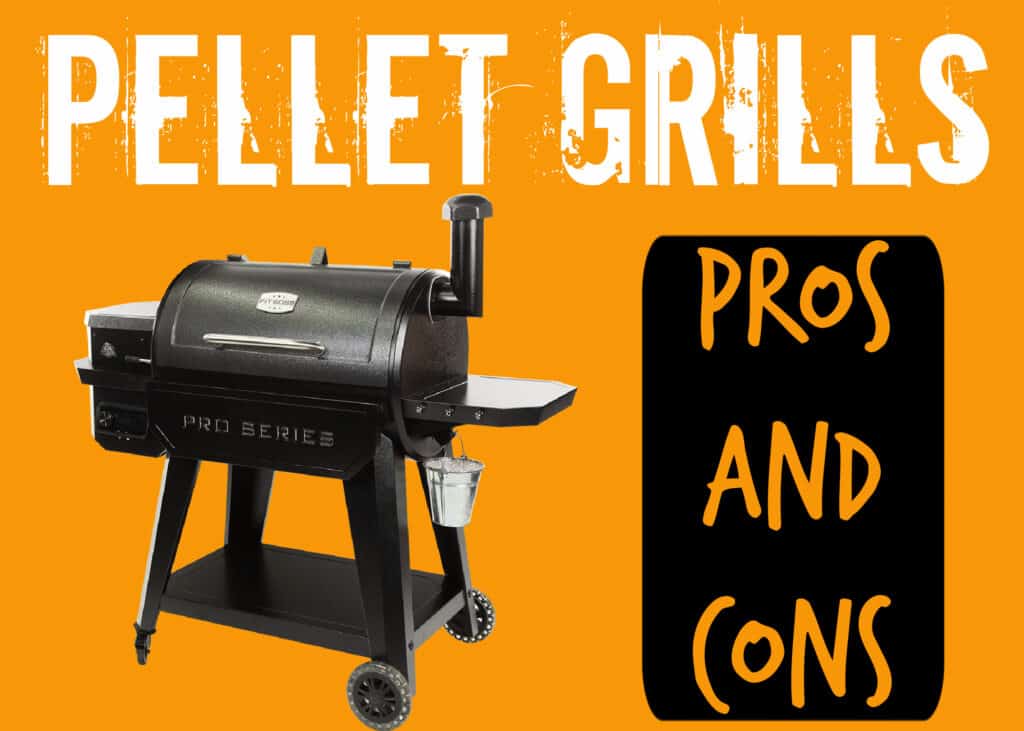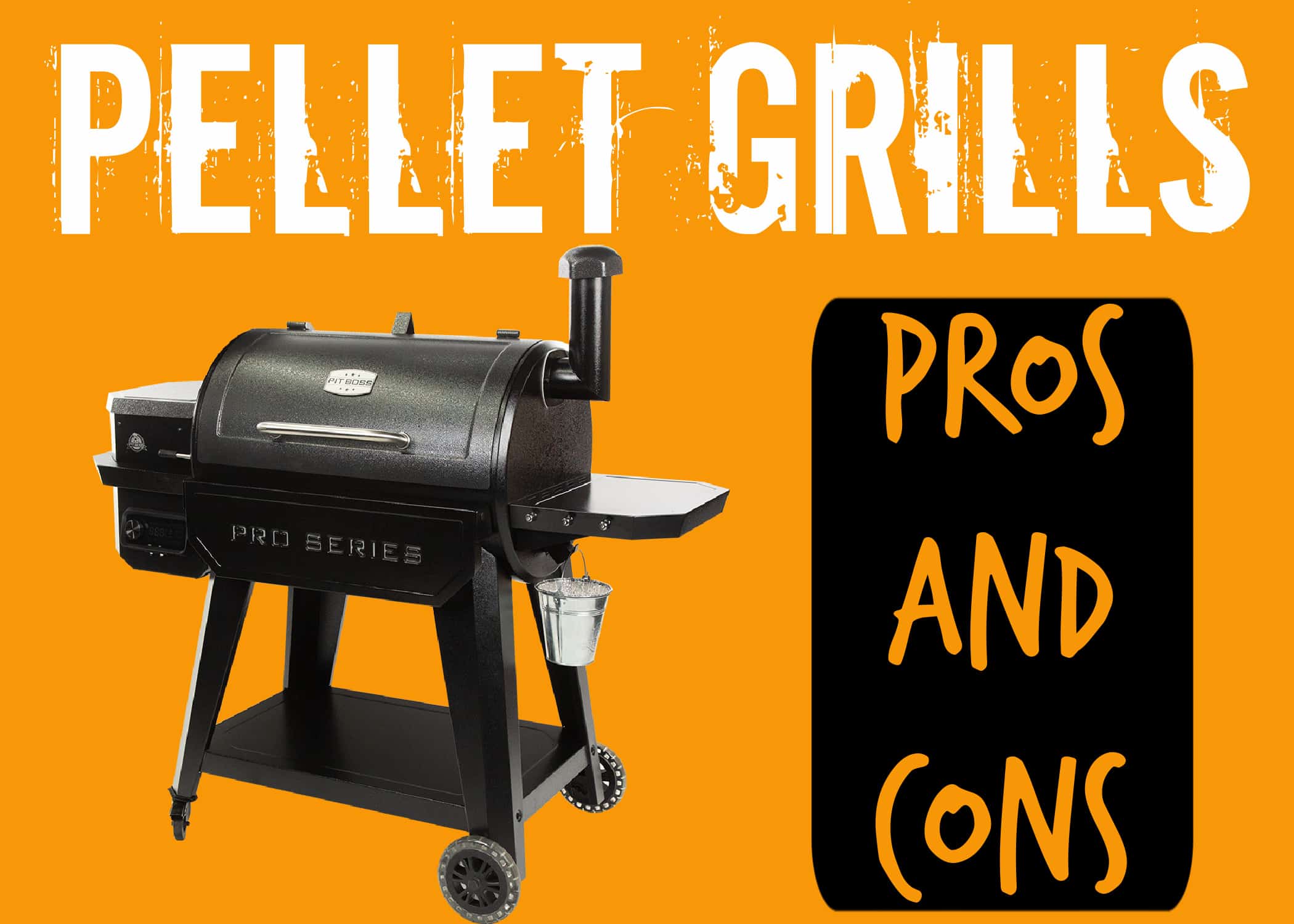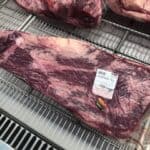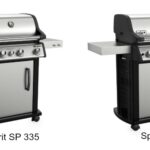Pellet grills are surging in popularity and for great reason! These grills are so easy to use that anyone can make amazing ribs and brisket!
However, if you get on the Facebook groups dedicated to barbecue, grilling etc. you will see a LOT of nincompoops spreading hate against this style of cooker. So what’s up? Are pellet grills the way of the future or not?
In this article I will show your the Pros and Cons of pellet grills so you can decide if this style of cooker is right for you.

What Is A Pellet Grill and How Do They Work?
The simplistic explanation is that these grills burn wood pellets to produce both the HEAT and the SMOKE when grilling or smoking. These grills require an electric power source to run the electronics, power an auger and make a fan blow.
Because these grills need to be plugged in many people think that they are “electric grills”. The HUGE difference between a pellet smoker and an electric grill/smoker is that an electric smoker produces heat from an electric heating element whereas a pellet smoker produces heat by burning wood.
There are many manufacturers of pellet grills with the most popular brands being:
- Traeger
- Pit Boss
- Z Grills
- Camp Chef
- Rec Tec
- Grilla Grills
These brands differentiate themselves by the complexity of the electronic controllers, size of the pellet hopper, ease of cleaning, etc. but when push comes to shove they all work on the same basic principle of burning wood pellets for heat and smoke.
The Pros of Pellet Grills
I have been using a pellet grill for about three years and am a huge fan of the concept. I have gotten rid of my gas grill and only use my charcoal grills on a limited basis. 90% of all of the grilling and smoking I do now is on my pellet grill.
Here are the main reasons that I have switched over to pellet grilling.
- Easy Temperature Management
- Flavor Upgrade Over Gas
- No Flare Ups
- Large Capacity
Easy to Manage Temperature
One of biggest obstacles people have when it comes to grilling and smoking meats is getting the fire started and controlling the temperatures.
If folks want to use a charcoal grill then they deal with getting the charcoal lit, adjusting the vents, waiting for temperatures to stabilize, adding more fuel during a cook, etc. If they are using a gas grill then getting it lit is easy but dialing in a temperature is difficult. Gas grills are designed for Low, Medium and High. What exactly those settings means is going to depend upon your grill, the ambient weather, etc.
Dealing with temperature control is the problem that dives so many people to using electric smokers where they can just dial in a temperature, sit back and relax.
When it comes to temperature control, using a pellet smoker is just as easy as using an electric smoker! You dial in a temperature, wait 15-20 minutes for the grill to stabilize and then start grilling!
Flavor is an Upgrade over Electric and Propane
Without question, meat cooked on a pellet grill tastes better than meat cooked with an electric smoker or on a gas grill.
When you use an electric smoker the smoke flavor comes from smoldering wood chips that have to be replenished throughout the cook. When you are cooking on a pellet grill the smoke comes from the continually burning wood. The smoke from burning wood smells and tastes better than that from smoldering wood and gives a better smoke ring to boot.
Same goes for meat cooked on a gas grill or smoker.
Minimal Flare Ups
The basic design of almost all pellet grills places shields between the flames in the fire pot and the dripping grease. This design has the intrinsic benefit of reducing flare ups to just about zero.
If you have been grilling on a cheap gas grill or directly over lit charcoal then you know that if you are not paying attention then a sudden flare up can happen and scorch whatever you are cooking.
Relatively Large Capacity
It doesn’t cost much more money for a manufacturer to produce a large pellet grill vs a small one. The core expenses of the stand, electronics, auger, fan, smoke stack, pellet hopper, etc are constant. The only difference is making the cook chamber a little longer and the grates a little bigger.
The end result is that most pellet grills are pretty dang roomy. This is especially true when compared to a typical charcoal grill. My pellet grill is average sized and can handle six slabs of baby back ribs if I use the secondary cooking grate.
The Cons of Pellet Grills
While I really enjoy my pellet smoker not everything is roses and sunshine. Here are the greatest limitations of pellet grills and how I have learned to deal with them.
- Needs Electricity
- Bad in the Rain
- No Live Fire Action
- Flavor Downgrade from Charcoal
- Limited Top Temperature
- Reliability
Still Depend Upon Electricity
One of the things I always liked about having a gas grill was that when the power went out during a tropical storm I could always step outside the following days and fire up the grill. Same goes with my charcoal grill.
When Hurricane Barry was pressing down on us this year though I realized that my stock pile of wood pellets for my grill might be useless. If that storm had knocked our power out then I would not have been able to use my grill. I had a little panic attack when I made that realization.
This might not be a big deal for you but it is something to be aware of, especially if you want to take you grill to a tailgate party.
Wet Conditions Are Not Your Friend
Rain is the enemy of pellet grills for two reasons.
The first is that water and electricity do not mix. I almost killed my pellet grill by leaving it out one night when a suprise thunderstorm hit us. It took a full day of carefully drying out electronics and connectors to get the grill running again.
The second reason is that moisture, even something as simple as high humidity, can cause the wood pellets to swell. Sometimes when the pellets swell they crumble and turn into useless piles of sawdust. Sometimes when the pellets swell they jam the auger and shut down your grill.
Charcoal and gas grills are MUCH more robust in wet conditions than pellet grills.
I Miss Playing With Fire
For me, a huge part of grilling is the direct interaction with fire. I love building fires. I love watching charcoal burn.
When you use a pellet grill the flame is hidden.
I know this should matter but it does for me. I miss playing with the fire when I use my pellet grill.
Flavor is a Downgrade Over Charcoal
Using a pellet grill gives you a MASSIVE flavor boost over using a gas or electric cooker. Equally as true is that you get a decrease in flavor compared to cooking food on a charcoal grill.
Chicken wings cooked on my charcoal grill are twice as good as those cooked on my pellet cooker.
Limited Top Temperatures
One reason food is better on a charcoal grill is that you can get hotter temperatures than you can on most pellet grills. Most pellet grills are going to top out in the 400-500F range which is not quite hot enough to properly sear a steak or get the skin on chicken wings as crunchy as I like.
From a presentation aspect, it is dang hard to get serious grill marks on a steak or pork chops using a pellet grill just due to temperature issues.
I don’t worry to much about this when it comes to steaks. My routine these days is to smoke steaks at 225F for an hour or so and then I sear them off with a scorching hot cast iron skillet on my kitchen stove. Works beautifully!
Cleaning is Essential
I know a lot of people who are seriously lazy about keeping their grills clean. They will let the grease and grime build up for months until they light the grill one day and get a serious grease fire on their hands. This behavior will bite you HARD if you try it on a pellet grill.
A pellet grill can build up a massive amount of grease. In addition the area underneath the heat deflector with fill up with the sawdust that gets created as the fan blows into the fire pot. If you ignite the built up grease with a big pile of sawdust then you will have one hellacious uncontrolled fire on your hands.
It is essential that you clean a pellet grill regularly and that includes using a shop vac to suck out all of the sawdust under the heat deflector.
Burnbacks Are Rare But Serious
Speaking about uncontrolled fires, there is a rare but real risk of something called a burnback.
A burnback is when the wood pellets that are still in the auger get ignited by the wood pellets burning in the fire pot. The fire in the auger can move backwards up the auger until it reaches the main pellet hopper where it will catch the entire hopper full of pellets on fire.
There isn’t anything you can do ahead of time to prevent a burnback. I have not had this happen to me and from what I have read it is a very rare event. However, it does happen from time to time.
Reliability/Warranty
The warranties on pellet grills are pretty lame when compared to similarly priced gas grills. The shortest warranty on a full size Weber gas grill is five years with most being covered up to ten years. In contrast, the industry standard for pellet grills is three years.
The main failure mode on pellet grills appears to be the electronics.
Temperature Swings
Temperature stability is a topic that gets a lot of debate in the barbecue community.
Some people will dial their pellet grill to 225F and expect it to stay at EXACTLY 225F. The reality is that the temperature is going to fluctuate based on a variety of factors. For some grills with expensive controllers the temperature will only bounce around by 5 degrees. For grills with cheaper controllers the temperature will swing by 15-30 degrees.
In my opinion the temperature swings are not a big deal. I think the problem comes in when people have a number to look at and they get obsessed over it. But hey, to each their own.
Final Verdict: Are Pellet Grills Any Good?
In my book the answer is, “Yes, the pros of pellet grills outweigh the cons.”
I have the financial resources to cook on whatever I want and these days I am cooking on a pellet grill. Sometimes when I want to kick back, pop open a beer and play with fire I will fire up my Weber kettle. But mainly I am cooking with pellets.



